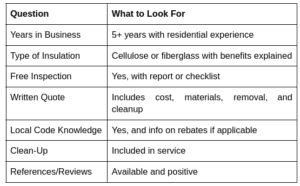Key Takeaways
- Always ask the contractor about their experience, licensing, and certifications. For residential blown-in insulation, 5 years or more is ideal.
- Learn about the different kinds of insulation (like cellulose vs. fiberglass) and ask which one is best for your area.
- Make sure you get a free inspection and a written price that includes materials, labor, removal, and cleaning up.
- Make sure the contractor knows the local building rules and rebate programs, and that they will clean up after the job is done.
- Check for reviews and references from past customers. Reliable contractors are open about feedback and examples of their past work.
Are you thinking about hiring contractors for blown-in insulation? Asking the right questions in the beginning could save you a lot of money.
Did you know? According to the U.S. Department of Energy, Blown-in or loose-fill insulation consists of small particles of fiber, foam, or other materials. These small particles form an insulation material that can conform to any space without disturbing structures or finishes. When hiring blown-in insulation contractors, it’s essential to ask the right questions to get the best value, great work, and results that last.
Here are the top 7 most important questions you should ask them before you hire an insulation contractor.
What to Ask Before Hiring Blown-In Insulation Experts
1. How Long Have You Been Providing Blown-In Insulation Services?
You need experience. You wouldn’t want a beginner to insulate your whole attic, would you?
Ask about:
- Number of years in the business
- What kinds of houses did they work on
- Special certification.
Most home insulation contractors who have been in business for at least 5 years know how to handle problems with insulation, old wiring, and safety.
Tip: Hire contractors who are qualified and have insurance. This keeps you and your property safe.
2. What Type of Blown-In Insulation Do You Use?
There are two main kinds:
- Cellulose (it’s good for the environment and blocks noise)
- Fiberglass is less expensive and great for keeping things cool.
Good blown-in insulation contractors should clearly explain:
- Which material is best for your space?
- Why it’s the best choice
- That it doesn’t catch fire, mold, or pests
3. Do You Offer an Inspection Before Installation?
A free check-up before placement is a must.
Here’s what they should check:
- Your current insulation
- Problems with air leaks or moisture
- Damage to the wiring or structure
If everything below the surface is fine, blown-in attic insulation will work well if the contractor skips this step-walk away.
4. What’s the Estimated Cost and Timeline for the Job?
Always get a written quote that goes into more depth. It should include:
- The cost of materials
- Costs of labor
- Removal of old insulation (if needed)
- Cleaning up
Get at least 2-3 estimates by searching for blown in insulation contractors near me and compare them.
5. Are You Familiar with Local Building Codes and Rebates?
An expert home insulation contractor should:
- Follow the rules in your area
- Check if you can get energy rebates.
- Help you with your paperwork (if needed)
Check sites like energy.gov to make sure that rebates are available in your area for blown-in insulation services.
6. Will You Handle the Clean-Up After Installation?
This is very important but often overlooked. You don’t want to be left with trash, dust, or even materials that you don’t need.
Ask:
- Will they get rid of all the trash?
- Can they do an inspection after the job?
- How do they clean up?
When you hire reliable blown-in insulation services, they include clean-up in the package.
7. Can You Share Customer Reviews or References?
A trustworthy contractor should be happy to share:
- Customer testimonials
- Pictures of before and after
- References for local jobs
It’s a red flag if they don’t want to show feedback.
Comparison Table: Key Questions to Ask

Why These Questions Matter
When you ask these, you:
- Avoid poor-quality work:
- Improve the performance of your insulation.
- Protect the safety and happiness of your family.
You’re also more likely to stick to your budget and not have any unexpected costs.
Quick Benefits of Blown-In Insulation
Don’t forget the reason why you’re doing this!
- Improves heating and cooling
- Fills in small holes in walls and attics
- Very good for the environment (especially cellulose)
- Great for improvements and retrofits
- Lowers monthly energy costs
Red Flags to Avoid
Pay attention to these signs:
- Trying to sell too much
- Not a written contract
- No license or insurance
- There are no clear answers to your questions.
Get the Right Insulation Team Today!
Choosing the right blown-in insulation contractors isn’t just about price; it’s also about getting good work and trust.
For reliable service and real customer happiness, consult My Insulation Guy. We help you protect smartly; we use our professional knowledge, clean work, and track record of success.
Get started on your energy-saving journey now!!
FAQs
Q1: How long does blown-in insulation last?
Insulation that is blown in can last up to 20 to 30 years, but this depends on the material and the weather. It’s good to do regular checks.
Q2: Is batt insulation better than blown-in insulation?
Yes, for attics and old homes. It gives a more consistent R-value and fills in holes better.
Q3: Can I install blown-in insulation by myself?
Sure. But it’s messy, dangerous, and may not honour guarantees. It’s better to hire blown-in insulation contractors.
Q4: How much does it cost to have insulation blown into an attic?
Prices vary by material, size, and work, but are usually between $1 and $1.50 per square foot.
Q5: Is it safe for my house to have blown-in insulation?
Of course. When put in correctly by home insulation experts, both cellulose and fiberglass are safe.

